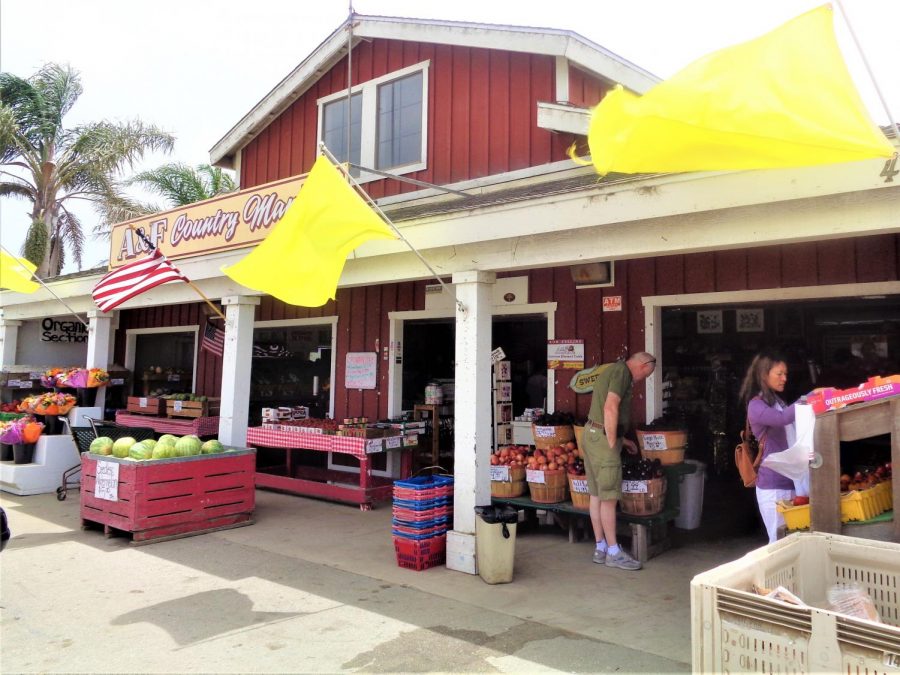Have you ever wondered why the fertile fields and valleys surrounding Moorpark College are chockablock with all kinds of fresh fruits and vegetables, yet they are barely for sale at local supermarket and grocery chains, if at all?
That’s because stores like Ralphs, Vons and Trader Joe’s fill their produce sections with imported items from places like Peru, China and Mexico, and relegate home-grown options to a fraction of their shelf space. You might ask, why do these stores buy produce from thousands of miles away when it’s raised right in our back yard.
“Those raspberries you love may have been grown in Chile, the tomatoes in Mexico, and the avocados in Central America,” said environmental analyst Jason Mark, editor of Sierra Magazine, of the Sierra Club, in “The Outsourcing of Food,” a 2005 article.
Compared with imported produce, locally grown items occupy sizeably smaller shelf and refrigerator space in grocery chains, making it hard for shoppers to spot them. Shoppers are even more dissuaded from buying bounty from the fields and orchards of Ventura County like broccoli, lemons and avocados because they can carry higher sticker prices than their imported cousins.
This idea of savings encourages many to choose imported over locally-grown produce, a selling manoeuver that has impacted farmers not just in Ventura County, but all around the country.
Farmers of soybeans and oats in Illinois, apple orchards in Washington, tomato fields in Florida and potato fields in Idaho now face foreign competition, wrote Markin the 2005 article.
“American farmers are battling a new kind of pest — imports from international rivals who can produce essential foodstuffs cheaper than they can be grown here,” said Mark.
This trend of outsourcing food started in the 1990s, after the World Trade Organization and North American Free Trade Agreement formed. NAFTA and WTO effectively encouraged major chains like Ralphs to turn farther afield for increased profits, which many believe led to a “collapse” of American farmers and fresh, tasty, healthy produce, wrote Mark.
The guilty party for this ongoing trend that negatively impacts America’s agriculture and economy, and shopper’s buying habits, appears to be corporate greed—prioritizing the almighty greenback over the noble pursuit of farming the land and self-sustaining communities, a vision that harks back to America’s founding fathers, and a series of Homestead Acts, the first of which President Lincoln signed in 1862.
Evaggelos Vallianatos, an environemntal strategist and author who worked for 25 years at the EPA, pointed out that a small percentage of farmers make most of the money.
“In [2012] rural America less than 3 percent of farmers make more than 63 percent of the money, including government subsidies,” said Evaggelos Vallianatos.
Outsourcing food even affects grocery chains that specialize in healthy, fresh foods.
Sprouts started as a Farmers Market in 2002, and now operates as a chain with 280 outlets.
“Local growers don’t grow enough produce for our bulk orders,” said Jimmy Coronado, produce manager at Ventura’s Sprouts. “We have a national distribution center. When we place an order it gets broken into smaller orders and shipped to each individual location. We get better prices, and pass them on to the customer.”
Outsourcing some foods can require irradiation, a process that extends its refrigerated life to survive long journeys to market, according to the the Food and Drug Adminsitration. The FDA has approved irradiation for fresh fruits and vegetables, inlcuding lettuce and spinach.
The executive director of Food & Water Watch, and author of the 2008 book, “Zapped! Irradiation and the Death of Food,” Wenonah Hauter, explained this process.
“Irradiation uses astronomically powerful blasts of X-rays, electron beams, and gamma rays to kill bacteria, to extend shelf life of food by delaying ripening and spoiling, and to eradicate fruit flies and other invasive pests,” said Hauter.
Irradiation deteriorates the health and flavor of produce. Thus, it seems greed and technological improvements in refrigeration and irradiation are forcing American farmers to fold for not matching foreign competitors’ prices.Although some farmers and farm stand operators in Ventura County may disagree.
Frank Carranco, owner of A&F Country Market, thinks outsourcing by supermarket chains has actually helped his business.
“I’ve been buying consistently from local growers for 13 years. Since stores started buying imported stuff, more customers come here because they complain it has no flavor,” said Carranco.
We must buy produce that’s fresher and tastier than imported produce to reverse this outsourcing trend.
Shop at local farm stands and farmers markets. Support Ventura County’s farmers and farmworkers, and your health.







